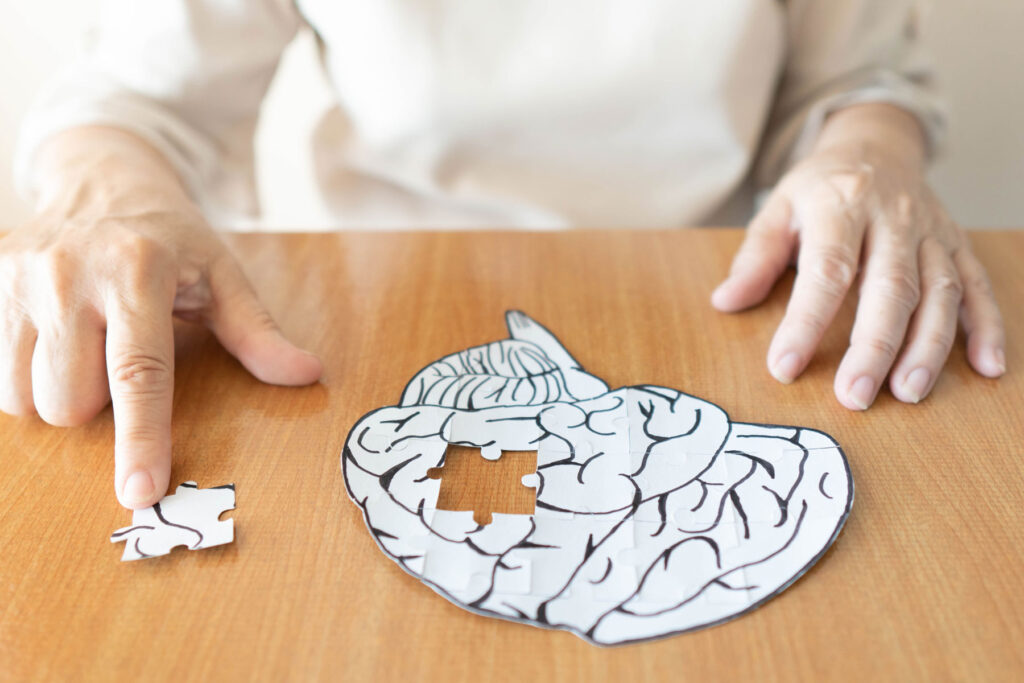Your aging loved one was recently diagnosed with dementia. Naturally, your first thought might be Alzheimer’s disease—it’s the most commonly known form of dementia. But are they the same thing?
Not exactly.
While Alzheimer’s disease is a type of dementia, not everyone with dementia has Alzheimer’s. The terms are often used interchangeably, but understanding the difference can help you make more informed dementia care decisions—and offer your loved one the support they truly need.
What is dementia?
Dementia is not a single disease. It’s a general term used to describe a decline in cognitive abilities—such as memory, language, problem-solving, and attention—that interferes with a person’s ability to function independently.
Think of dementia as an umbrella. Underneath it are many different conditions, all of which share similar symptoms but stem from different causes. Alzheimer’s disease is the most common, but it’s not the only one.
Other common types of dementia include:
- Vascular dementia, often caused by stroke or reduced blood flow to the brain
- Lewy body dementia, which includes symptoms similar to Parkinson’s and hallucinations
- Frontotemporal dementia, which affects personality, behavior, and language
- Parkinson’s disease dementia
- Huntington’s disease
- Creutzfeldt-Jakob disease
- Mixed dementia, which is a combination of two or more types
Each condition has its own progression and challenges, making it especially important to get a thorough diagnosis from a medical professional.
What are the symptoms of dementia?
Dementia affects much more than memory. While forgetfulness is often the first noticeable symptom, dementia can impact many aspects of daily life—from managing medications to handling conversations or recognizing loved ones.
Common symptoms include:
- Short-term memory loss or confusion
- Difficulty finding words or understanding language
- Trouble making decisions or solving problems
- Mood swings or personality changes
- Withdrawal from hobbies or social activities
- Trouble navigating familiar places
- A decline in personal hygiene or nutrition
- Increased anxiety, depression, or irritability
To be diagnosed with dementia, a person typically shows a decline in at least two cognitive areas. Early signs can be subtle and easy to dismiss, which is why it’s important to trust your instincts if you notice a shift in your parent’s behavior, routine, or mental clarity.
Understanding Alzheimer’s disease
Alzheimer’s disease accounts for 60–80% of all dementia cases and is characterized by the gradual breakdown of brain cells. It typically begins with memory problems and worsens over time, eventually affecting speech, decision-making, and physical coordination.
Although it most commonly affects adults over the age of 65, early-onset Alzheimer’s can develop earlier. The progression is usually slow and varies from person to person, but it eventually leads to the need for full-time care.
Unlike some other forms of dementia that may result from a specific event (like a stroke), Alzheimer’s tends to progress gradually and unpredictably, making early planning especially important.
How is dementia treated?
While there is currently no cure for most types of dementia, there are ways to slow progression, manage symptoms, and improve quality of life. Early diagnosis is key.
Treatment may include:
- Medications that help manage memory or behavior
- Occupational or cognitive therapy
- Physical activity and brain-engaging tasks
- Mental health counseling or support groups
- Nutrition and hydration support
- Routine and structure to reduce confusion
Lifestyle changes like staying socially active, eating a balanced diet, and following a consistent daily routine can also support emotional and cognitive health.
Creating a care plan early
One of the most important steps after a dementia diagnosis is making a care plan—while your loved one is still able to share their preferences. This plan can guide future decisions and ensure they receive the care and dignity they deserve as their needs evolve.
Your care plan should address:
- Legal and financial documents
- Health care proxies or advance directives
- Safety concerns at home
- Support systems for the primary caregiver
- Long-term options, such as memory care communities
In time, many families find that managing care at home becomes overwhelming. That’s when exploring specialized care settings can provide relief—and better support for your loved one.
When is memory care the right step?
It’s different for every family, but there are a few signs that memory care may be the right next step:
- Your loved one is becoming increasingly forgetful or confused
- They’re skipping meals or medications
- You’re noticing safety concerns, like wandering or falls
- You’re feeling burned out or overwhelmed as a caregiver
- They seem isolated, depressed, or withdrawn
How our memory care communities can help
At The Arbors and The Ivy, we provide compassionate, tailored memory care for those living with dementia and Alzheimer’s disease. Our communities are built to create structure, safety, and connection—so residents feel comfortable, empowered, and engaged.
Whether your loved one is in the early stages of dementia or needs more comprehensive care, our team is here to walk alongside your family with understanding and support.
Learn more about our senior memory care programs and how we help residents thrive with comfort and dignity. Contact us today for more information or to schedule a tour.

